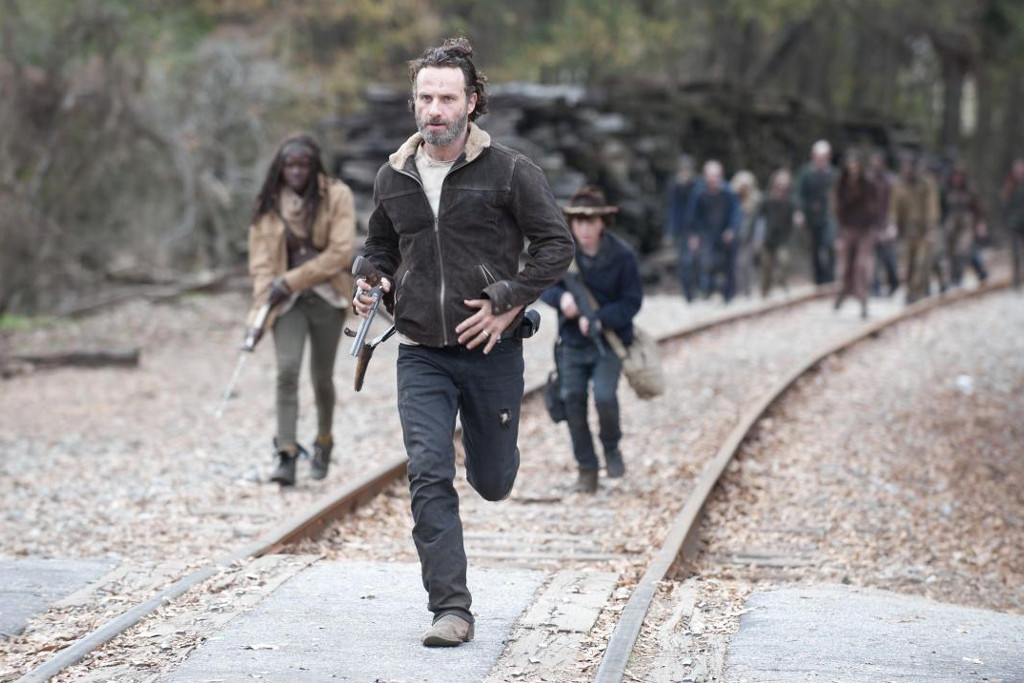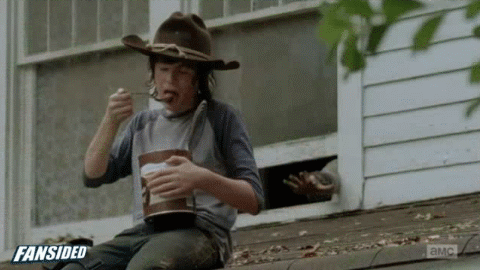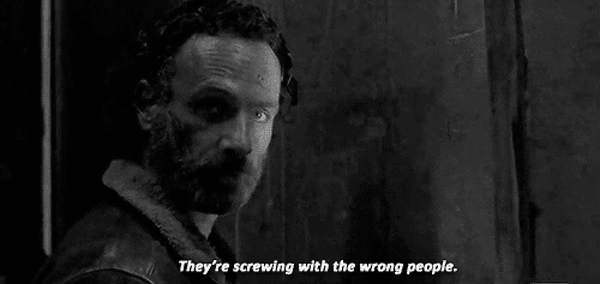The Walking Dead’s Shocking Finale, And What It Means For Next Season
Yesterday's great and surprisingly brutal fourth season wrap set the stage for a harrowing series return in October.

Spoilers galore, people. Also, braaaaaaaains.
–
Well, that was brutal.
For all of its character-chewing action, The Walking Dead has succeeded because it’s focused on the small, intimate details of surviving a zombie apocalypse. It’s all about relatability: the show is made for yelling at the TV and arguing with bored housemates/spouses/pets/yourself about the action, because hypothetically ‘What I would do is…’ makes for an engaging narrative.
But seeing our tortured hero sheriff Rick tear out bandit chieftain Joe’s throat while trying to prevent his own son Carl from being raped, then using his teeth like a walker and slicing the attempted rapist from groin to throat (with additional extended stabbing just for good measure) was a stark reminder that survival isn’t all prison farms and planting crops. It also makes ‘What I would do…’ sound pretty stupid.
You’d also think such a scene would be the season’s high point for brutality, but nope. That honour was reserved for one of the best ‘oh fuck!’ television moments of the year, when Carol and Tyrese returned from their walk to find TV’s most convincingly fucked-up kid Lizzie covered in blood, a knife in her hand and little sister Mika dead on the ground. And that scene was equaled when Carol walked Lizzie (who was convinced that walkers weren’t dead, just ‘changed’) away from the house, told her to “look at the flowers”, and shot her.
Phew. What a season. And that’s only two of the most horrifying/excellent moments of Season Four. There were also fire zombies.
–
Breakup the group, see what happens
After a character-cleaning mid-season finale, The Walking Dead took a slightly different approach to this fourth season’s second-half. Once the smoke from the burning prison cleared, we were left with four disparate groups of survivors wandering through the sweaty, zombie-filled forests of Georgia.
Providing a narrative spine for each of the four groups were the train tracks they were all following — courtesy of prominent signage — to the promised land of ‘Terminus’. It was an interesting, if obvious approach (breakup the group, see what happens), and it gave new showrunner Scott M. Gimple a chance to flesh out some of the more under-utilised, living, breathing walkers.
We were given a glimpse into Michonne’s fascinating back-story, discovered that the difference between Daryl’s past and current life was essentially ‘+ zombies’, and figured out that Carol might just be the show’s best character. This method of spending time with small pods of characters delivered some of the best moments of the entire series: Maggie using her makeshift ‘No Parking’ axe, Glenn and Tara’s tunnel excursion, Rick hiding from bandits under a bed, Carol’s “look at the flowers” moment, Carl and his pudding.
Focusing on small bands was fun: it kept the action nimble. We watched characters interacting without a perceived social structure around them, while the zombie run-ins felt like an appropriately constant deadly menace, and the season moved fairly quickly and efficiently. It also meant storylines like Daryl and Beth finding a moonshine still (and lighting a fire to a soundtrack of Mountain Goats) or Carl heading out on his own and into a tunnel with Glenn and Tara weren’t as repetitive as the ‘find an inviting place to stay, see it all go bad, run away’ arc that the show falls prey to.
After seven episodes of multiple narratives (and some new faces) in the second-half of the season, it’s clear just how much The Walking Dead needs a feeling of onward motion, even if it’s as obvious as train tracks and a logical endpoint like Terminus. The showrunners learnt from the farm and the prison that to stand still is to watch your narrative momentum die; there’s only so much fuel for tanks in the Georgian hinterlands.
–
“They’re screwing with the wrong people”
Once our heroes made it to Terminus, we were treated to an excellent finale, with a yard full of human skeletons stripped of their flesh, railway boxcars used as storing pens for people, and creepy rooms full of candles with defiant, cult-ish slogans painted on the wall. Also, did Rick earlier explain the concept of trapping a rabbit with a snare by funnelling them into a noose? Of course he did! Hooray for foreshadowing.
But what’s important in The Walking Dead — much as in Breaking Bad — are the truisms behind how we self-identity within the constraints of society, and what happens once those boundaries are lifted. The idea of having everything break down ‘out there’, and meaning you’re forced to figure out who you really are.
It’s intoxicating, sure, and it’s also fucking terrifying. Daryl knows it, because he hasn’t had to change; he just realises he needs acceptance (“They had a code. It was simple. It was stupid. But it was something.”). And Carol understands that in this world survival means sometimes shooting a child, or killing infected people in order to save a population.
Yet it’s in Rick and Hershel’s exchange in the finale’s flashback (and it was great to have Scott Wilson back, even fleetingly) that it rings ever more true. Rick, exasperated by Hershel imploring him to take up farming (explaining the Farmer Rick transformation at the start of the season), finally says, “Things changing in here doesn’t change things out there…”
Hershel looks up and says, “Well. It’s a good place to start.”
No matter how much Rick fights the brutality of the world he’s now a part of, reconciling who he is, who he wants to be, and who he has to be, isn’t easy.
As the harrowing, excellent season comes to a close, the heavily armed, probably cannibalistic denizens of Terminus have trapped Rick and his reunited friends (the Rickettes) in a boxcar (we’re in the dark on Beth, Carol, Tyrese and Judith). But when Rick — the guy who tore out a man’s jugular with his teeth while his son looked on — utters the season’s chilling sign off, “They’re screwing with the wrong people,” you’re inclined to believe him.
What’s changed in him probably doesn’t mean good things for next season for those in charge of Terminus.
–
Season Five of The Walking Dead returns to Foxtel’s FX in October.
–
Jaymz is a New York-based writer, super-yacht enthusiast, hi-tech jewel thief and Bengal tiger trainer. He enjoys wearing monocles, finely spiced rum, constructing pillow forts and zip-lining from Hong Kong skyscrapers.

